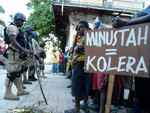Caracol Free-Trade Zone Jeopardizes Natural and Cultural Heritage | La zone franche de Caracol met en péril le patrimoine naturel et culturel du Nord-Est
By Rachelle Charlier Doucet, AlterPresse | Commentary and translation by Dady Chery, Haiti Chery. A massive industrial park is scheduled to open in the Caracol Bay area of Haiti, although no plan is in place to mitigate the park’s impact on a region that has been proposed as a World Heritage Site for its ecological, historical, and archaeological importance. (English | French)
Continue reading →








